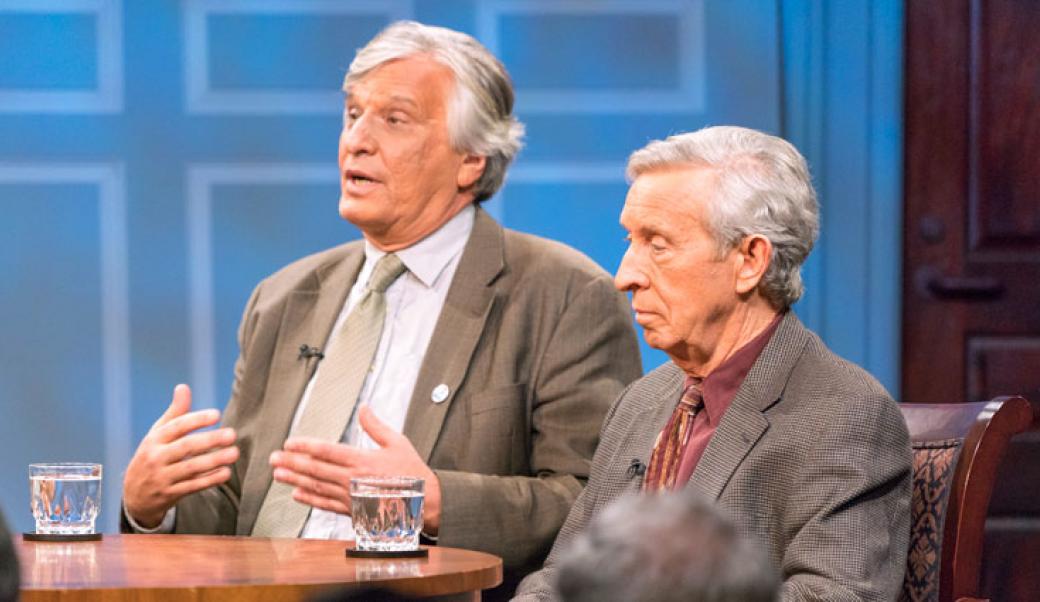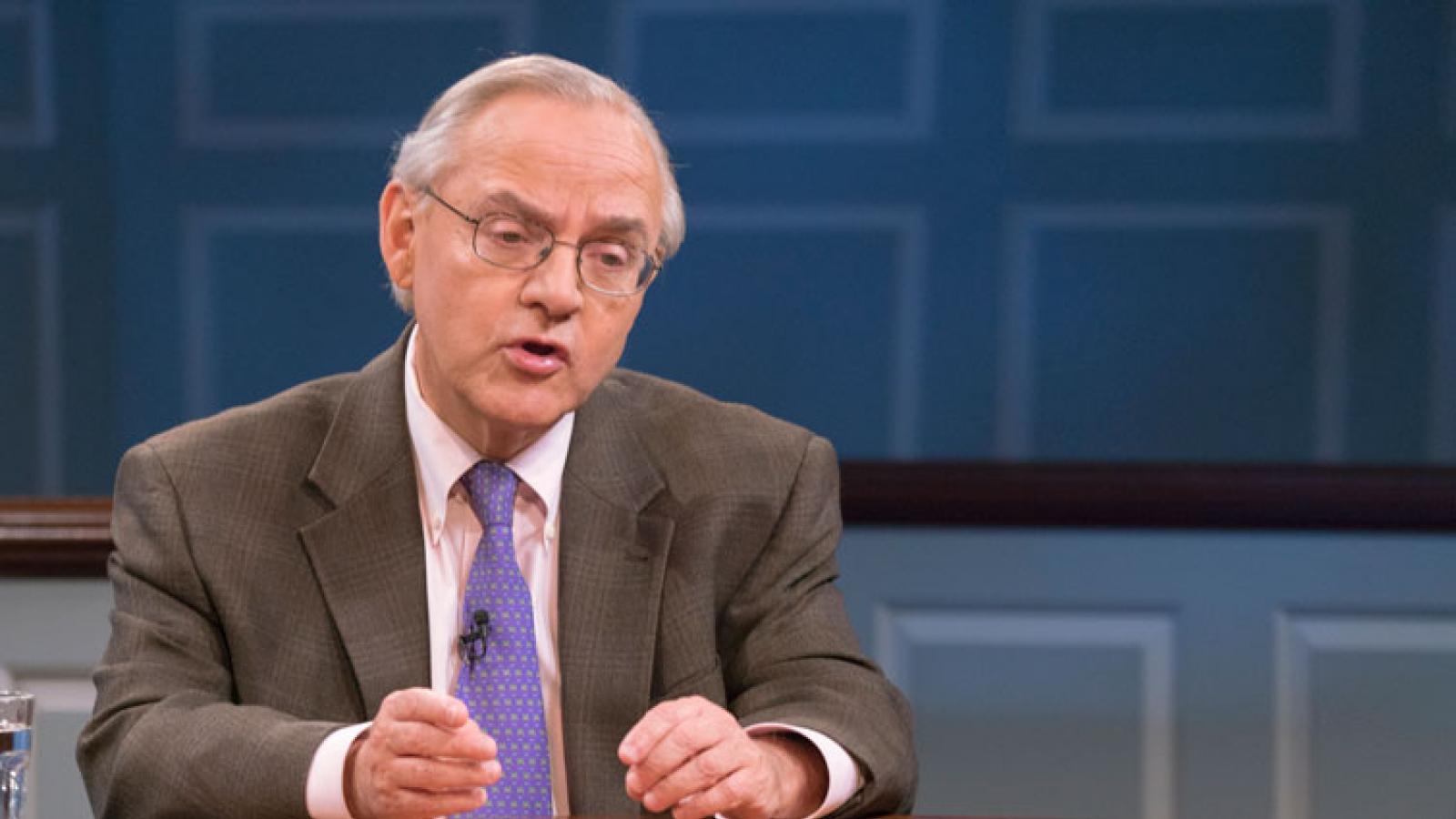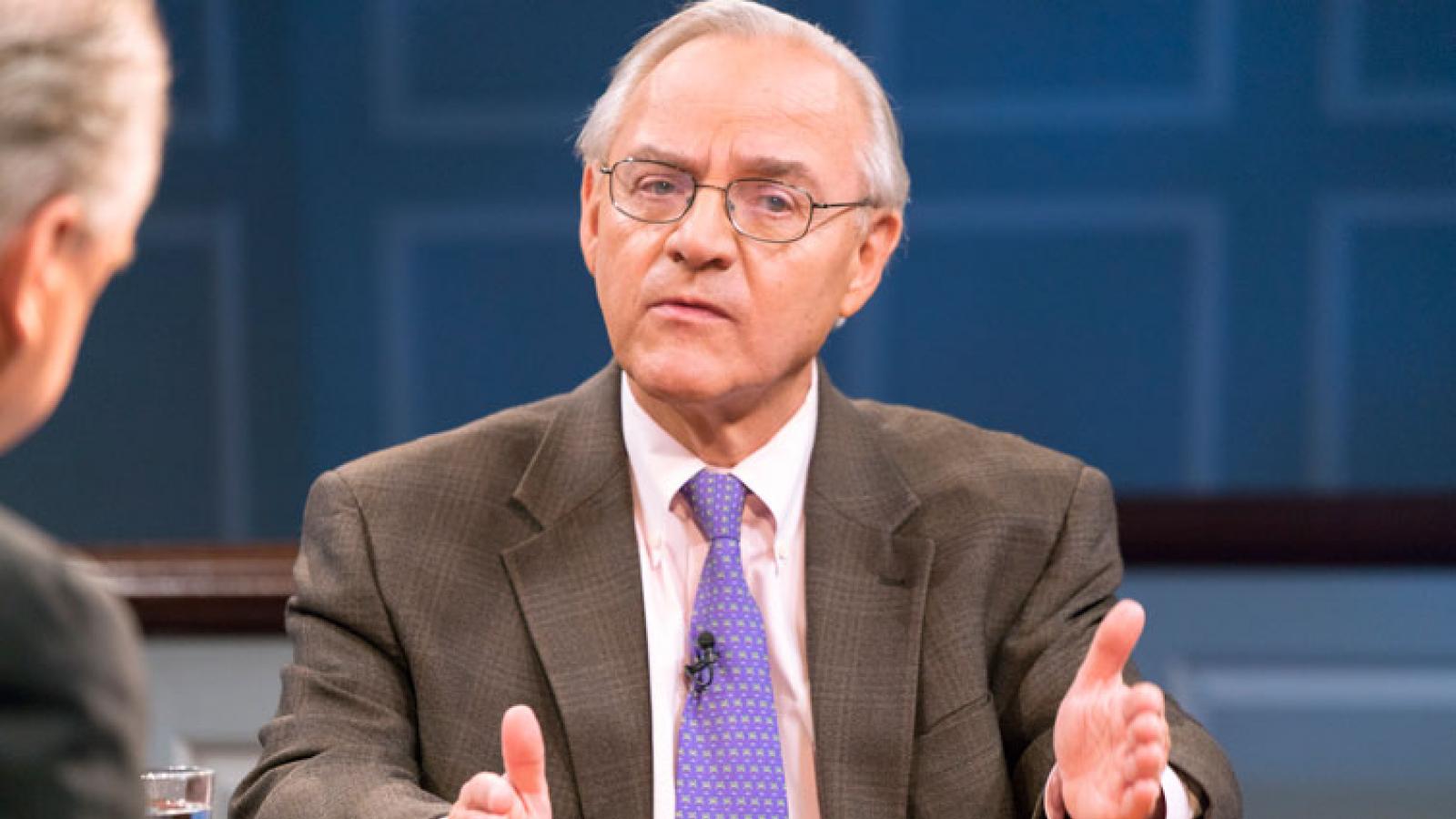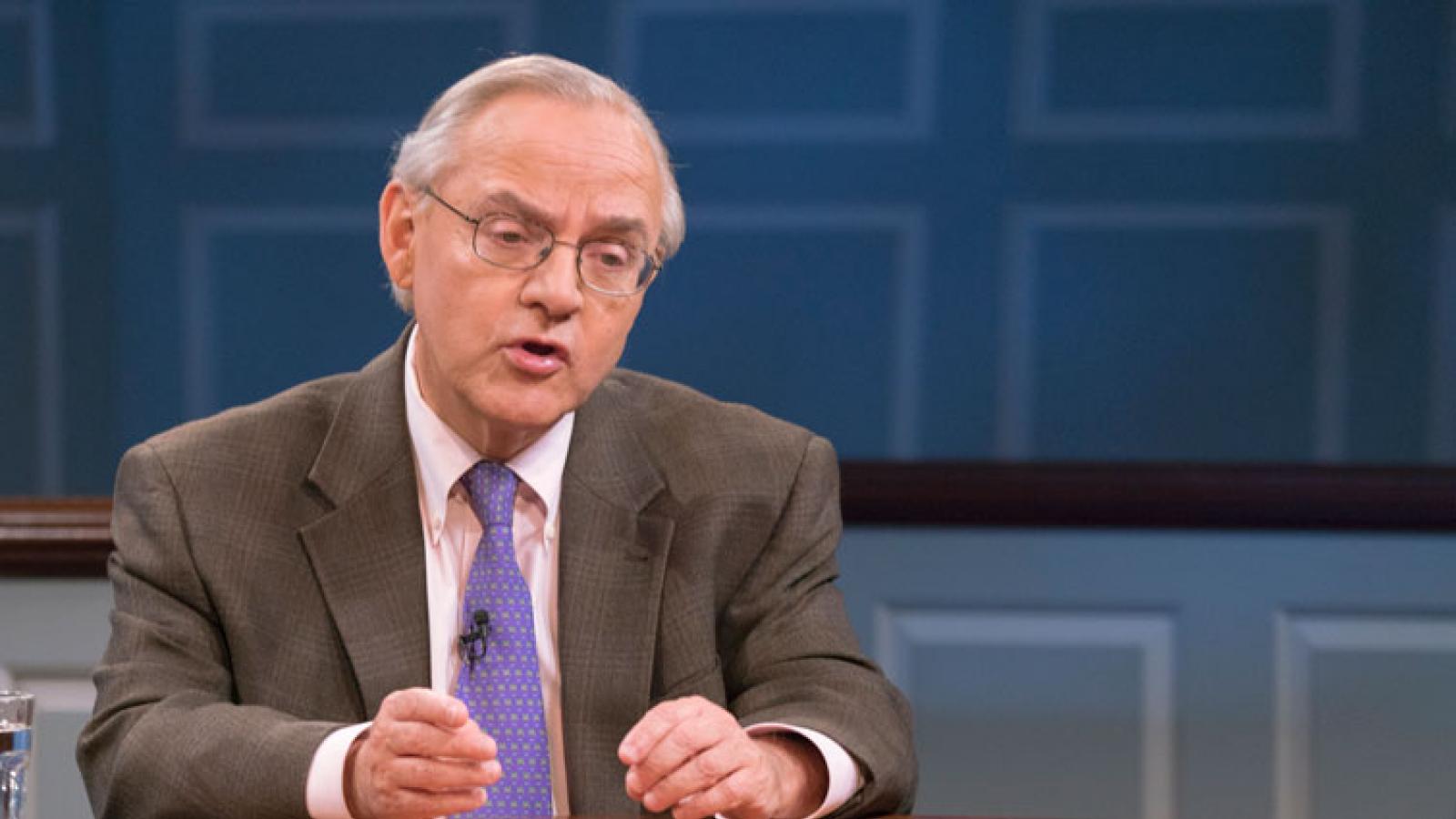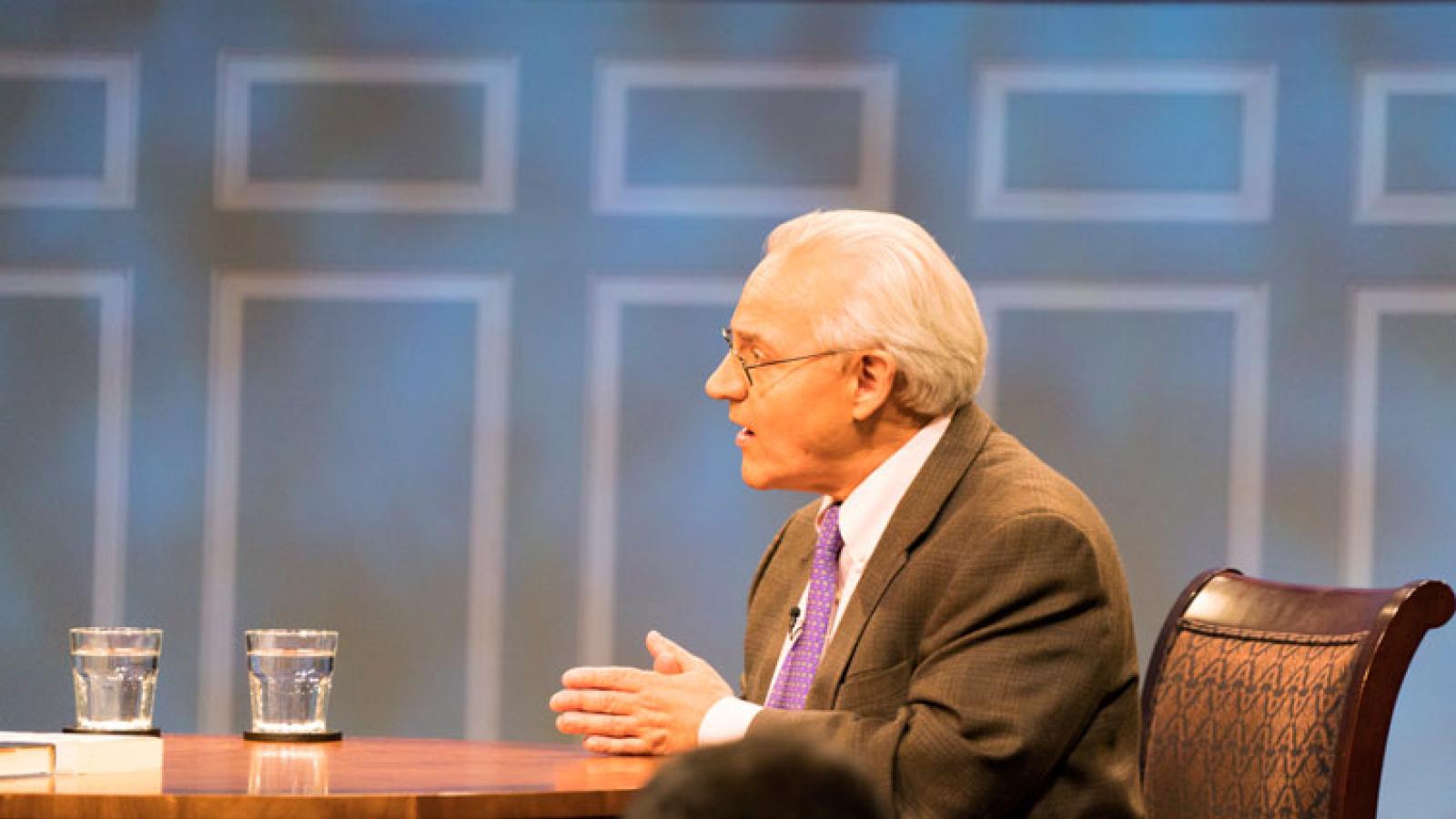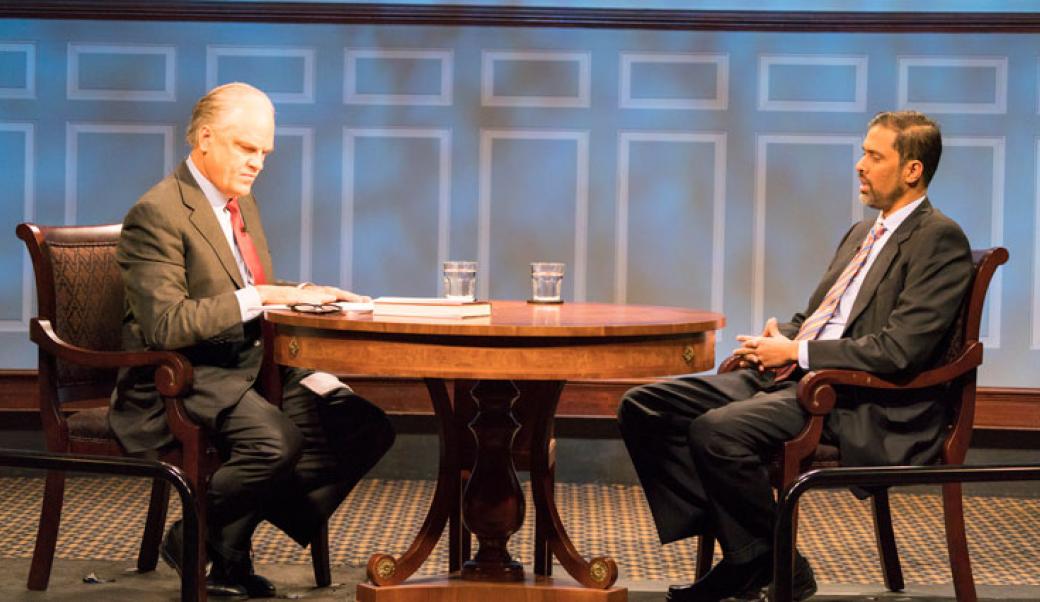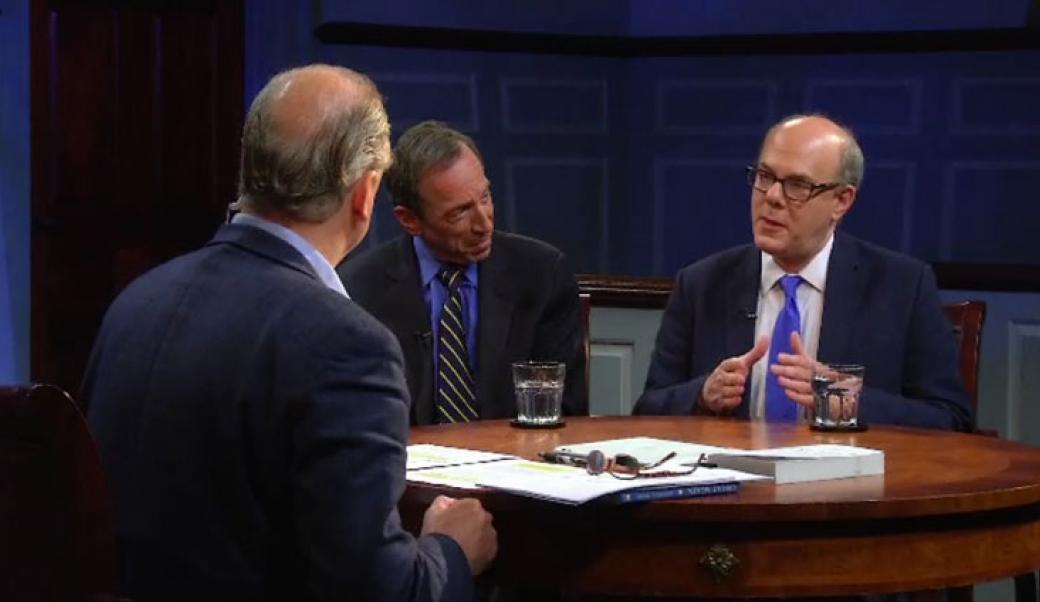About this episode
February 12, 2017
E. J. Dionne
Our guest in this episode is E. J. Dionne, longtime columnist for the Washington Post and the author of eight books including, most recently, "We Are the Change We Seek: The Speeches of Barack Obama." We asked him what challenges face the GOP as it transitions from eight years as an intransigent opposition party to the party in power. And can Democrats preserve some of the programs they hold most dear without damaging the operations of our democracy?
The First Year
First Year 2017: Can Donald Trump get government working?
Transcript
Douglas Blackmon: Welcome back to American Forum. I'm Doug Blackmon. In the weeks since President Donald J. Trump was inaugurated, we've had guests from across the political spectrum and have asked for their wisdom on the issues that will be most crucial in this coming first year of the Trump presidency, their advice for President Trump and his advisors and what counsel they would give to the American people; those who supported the election of President Trump and those who opposed him.
Here at the Miller Center, we study the office of the president and encourage decent, civilized, informed discussion among our citizens. Over the past year, we've undertaken a special effort to identify crucial questions facing the nation and the presidency, gathering a range of experts around each one, and developing nonpartisan recommendations for how our national government and the president can work best for the American people. You'll hear from hardcore conservatives to centrists and unabashed liberals and progressives. Our guest in this episode is one of the latter, E. J. Dionne, longtime columnist for the Washington Post and the author of eight books about American politics and life, including most recently, We Are the Change We Seek: The Speeches of Barack Obama. We'll ask him what challenges face the GOP as it transitions from eight years as a stubbornly intransigent opposition party, to being the party in power, demanding that the new opposition cooperate in ways that Republicans rarely did. At the same time can Democrats, out of power, preserve some of the programs they hold most dear without damaging the operations of our democracy. And how does each party do all this while positioning for upcoming congressional and state races, worrying about which way an unpredictable new president is next going to swing, and with talk beginning already, about the 2020 presidential campaign. E.J. Dionne, thank you for being here.
THE QUESTION: Can President Trump fix our broken government?
E. J. Dionne: It's great to be here. I can't talk about 2020 soon enough.
2:45 Blackmon: It gives me the chills just to say that. So, you have attributed, in things you've
written since the election in November, you've attributed President Trump's victory to several explanations; Russian Premier Vladimir Putin, FBI Director James Comey, Republican Party leadership, the Electoral College, and as you identify them, college educated white men, and I think that was all in one column, that you identified all those people, and that one concluded, "I truly do fear for our country's future." Are things really that bad?
Dionne: I am more afraid than I have ever been in my life. In fact, I went back to check myself on that assertion, to see if I was fooling myself, and I read—I was very upset about the recount in Florida and the Supreme Court's decision in Bush v. Gore. I'm one of those who hasn't gotten over it, and so I was very critical of George W. Bush. But I actually read columns I wrote after that, and I did not feel about George W. Bush, even though I opposed many of his policies, as I do about President Trump, because in the case of George W. Bush, I knew clearly, that he was a committed "small-d democrat," that he fundamentally believed in this system. In his inaugural address, which I surprised myself by praising in this old column, my old self, you know he did speak about compassion and there was a kind of openness there. With Donald Trump, you do not sense any of that openness. You certainly got none of that in his inaugural address. You got none of that from the period of the election to January 20th, and you're certainly not getting it now, and there is a kind of authoritarian or autocratic side, to the way he has spoken during the campaign. If a network said something he didn't like, he talked about threatening their antitrust status, that's not encouraging. Kellyanne Conway's famous line about alternative fact, which I think are simply lies, so are untruths, and so I worry very much. And then this executive order that, you know, he issued at the end of the month, where he, against all of the interests or values of the United States, targeting countries, claiming it's not a ban on Muslims, but then having this provision saying well, minority religions can come in, this was clearly a Muslim ban veiled as something else, and there are plenty of conservatives and plenty of Republicans, who know this is a bad idea. It doesn't make us safe, but it threatens to alienate lots of Muslims around the world who want to support us or are sympathetic to democracy. So I am more alarmed than I have ever felt about any other president.
5:37 Blackmon: The popular vote did actually go against President Trump. We've seen massive numbers of people out in the streets, his popularity numbers or his approval rating, looks shaky as an early president. Isn't all of that also a kind of sign that the system is stable in its own way, I mean you know that people are registering their opposition to all of this? Does that mitigate against your sense of danger?
FACTOID: Trump job approval ranged from 36% to 43% in January 2017
Dionne: The rising opposition does reassure me, and not just because I am critical of the president, but it says to me that the country is mobilized, will not sit back and easily accept what many people in the country see as a violation of rights. So yes, America is America and that makes me very happy, and we have a tradition of opposition. I suspect the anti-Trump opposition will learn some things from the old Tea Party. It will be very interesting to see what people who praise the Tea Party have to say about demonstrators against this president.
FACTOID: Tea Party emerged in spring 2009 in opposition to election of Obama
6:40 Blackmon: What do you make of the case that there's the simple observation that regardless of any of these other contributors to the outcome of the race, that what it really boils down to is just that the person who loses the race just lost the race because they didn't run fast enough, and that in this case, Hillary Clinton didn't run a winning campaign or was so flawed a candidate to begin with, that she could never—couldn't defeat so troubled a candidate as even now President Trump was. What do you make of that argument?
Dionne: Well, there were a lot of people that said only Clinton can beat, that one person she can beat is Trump and the one person he can beat is Clinton. First of all, because I see the impact of Comey especially, at the end of the campaign, as so strong, I'm reluctant just to say she ran a terrible campaign, because it would have been a just fine campaign if that hadn't happened. She would have carried at least Michigan, Wisconsin and Pennsylvania, and then we'd be having an entirely different conversation. Look, I have a lot of respect for Hillary Clinton. I think she had, you know, a really important public life, both as a senator, as secretary of state, as somebody who started her life committed to kids, so I'm not one of those people inclined to run down Hillary Clinton just because she lost an election. In fact, I think Democrats in general are pretty bad about that. Whenever their person loses, they tend to just pillory them, and I'm not into that. On the other hand, if you want to ask me were there things that campaign should have done differently, sure. Obviously, they should have campaigned more in Wisconsin and Michigan. I think they should have realized that there was a problem with white working class voters, that she, in Wisconsin, the last time I looked at the exit polls, she had gotten—where their estimate was, she had gotten 34 percent of the white working class, Barack Obama got 45 percent. Democrats don't need to win the whole white working class, but they need a significant share. I think a lot of people who talked about the Obama coalition, forgot that that was a piece of the Obama coalition, along with young people, Latinos, African Americans and others.
8:42 Blackmon: There have been critics, and I think you've referred to some of this in some of your columns, the idea at least, that the Democratic Party has lost touch to some degree, with the voters that you're talking about, that maybe it is too much of a Cadillac liberal party, that it needs to get back to a much earthier footing of not just poor African Americans, but lots of other poor kinds of folk, and find a way to talk in a way that they can be heard in West Virginia, and that the inability to do that is a big part of why the party remains vulnerable.
Dionne: Umm, first of all, there are plenty of Democrats out there who actually represent those folks in western Pennsylvania, in Ohio. I don't think Senator Sherrod Brown has lost track of those folks, I think there are a lot of politicians in the party who haven't lost track of those folks.
I think secondly, I also don't like that argument when it's tasked as well, we've spent too much time worrying about women, Latinos and African Americans, now we've got to worry about this group. No. The Democratic Party cannot, should not, abandon its commitment to African Americans, Latinos and women's rights.
FACTOID: Clinton won about 54% of women voters in 2016 presidential election
However, if you're going to argue that there can be a kind of elitism among liberals. You know, I hate the term flyover country. Flyover country is a big majority of the United States. I don't know what part of the coasts you're going to define. These are great Americans. These are people who were traditionally Roosevelt, Truman, Kennedy, Johnson, Clinton Democrats, who have always looked to government to give them a hand to become self-sufficient, to create the ground on which they can form unions to help them send their kids to college.
So yeah, I think that liberals, progressives, do need to talk to them more. I think that Bernie Sanders, in the primary, got support in part because he directed some of his attention to them. The sad irony is the Clintons, both Hillary Clinton and Bill Clinton, have been very aware of this constituency, have been very engaged with this constituency.
11:01 Blackmon: Is Trump's emergence and his bringing into the Republican fold, at least for the moment, a group of others that traditionally just haven't voted, but bringing in a bunch of new people on their side of the ledger, does that make him the salvation for the GOP or does he represent that the real GOP has lost the war over its soul? What does he mean for the GOP?
Dionne: I don't think he's brought in that many new voters, first of all. If you look at the Republican primary, a lot of those voters, some of them were people who didn't vote in primaries but voted in the general election. Trump didn't come out of nowhere. The birtherism that you know, the notion that President Obama wasn't born in the U.S., created a real following inside the Republican Party and the conservative movement. A lot of Republican leaders knew it was wrong and were even reluctant to take on even that idea, which was all made up, which was a lie. So, I think Trump speaks for a substantial part of the Republican Party, and that's why the Republican leadership has been so reluctant to take him on, on the executive order barring people from entering the country, from that group of Muslim majority countries. There were a lot of Republicans who, five minutes ago were against that or let's put it more fairly, six months ago, a year ago, were against that. Paul Ryan was against that, Mike Pence, his vice president, was against that. Now, there is a real fear on the part of a lot of the Republican leadership to speak out. There have been Republicans who have spoken out and I give them a lot of credit, people like Lindsey Graham and John McCain and others, and I think this issue will present Trump with a real problem in his party, but I think the Republican leadership right now seems most interested in, as Grover Norquist, the great antitax organizer put it, they're most interested in these two fingers holding a pen—again, I'm following Grover here—to sign big tax cuts and big budget cuts.
13:01 Blackmon: I count 11 GOP senators and then the Independent from Maine, Angus King, who have all taken open positions critical of some of these early steps by the Trump administration. Is there any possibility of some sort of central cooperation, centrist cooperation, emerging in the Senate?
Dionne: Over the early period of the Trump presidency, I have been reminded of a line that former representative Barney Frank used. He represented the district I grew up in, in Massachusetts, and Barney once said, "The moderate Republicans are always there when you don't need them." I have been struck that Republicans have taken positions, like on Tillerson, where the appointment of Rex Tillerson as secretary of state, you know John McCain, Lindsey Graham, were very, very critical, and then it turns out they're going to vote for him anyway, and in the early days, you just haven't seen Republicans being willing to break. Now there were a few; Charlie Dent, the congressman from Pennsylvania, is a good example of somebody that I think will be quite independent. He's got a fairly Democratic district, but he's always shown that kind of independence, he wouldn't support Trump in the election. I think McCain and Graham, on some issues, may just get tired of this and frankly, I don't understand why John McCain, whose service to our country was demeaned by Donald Trump, cannot just say there is no reason why I owe this man anything, and I hope he comes to that. So there may be some issues on which this is the case.
The internal Republican discussions about Obamacare are interesting and you know, God bless the whistleblower who gave the Washington Post and other media outlets, a tape of that internal Republican meeting, about where there's a lot of alarm about what it means to repeal Obamacare. One Republican member said, you know, if we do the things that we're talking about, this will be known as Trump Care and we're going to own it lock, stock and barrel. And they are discovering that it's easy to say repeal and replace. It's a whole lot harder to replace. And so some of those Republicans, Lamar Alexander is another one, who had been a kind of pragmatic conservative governor in his past, are saying you know, we need to be more careful here. So maybe once in a while you'll see that, maybe on some of the budget issues you'll see that. Maybe some Republicans will get cold feet about block-granting Medicaid, when they see what that does to their own states. I'm hoping there are moments like that and you know, I've been around a long time. I am not someone who judges human beings by their party, there are plenty of Republicans over the years that I agreed with on some things and disagreed with on others, but respected, but I think there's a lot more pressure in that party right now than there used to be, to walk in lockstep, and a lot more punishment from what you might call tribal media, if you dare to break.
16:08 Blackmon: You also wrote a column not that long ago, that suggested that there might be some good that can come from the Trump presidency. What might that be?
Dionne: Well actually no, it's true, I did write that column. I will not present alternative facts. The first thing I said is that this mobilization of people into politics, this sense that people on the moderate and progressive sides may have gotten a little bit complacent, you know there's no complacency now. And I'm particularly struck by the activism of young people, where I think that there is a whole new generation ready to mobilize. They don't like a lot of what President Trump is doing and I think they could begin to transform politics. Again, at the women's march, one of the striking things was it transcended generations, you know from old people wearing signs like, "I can't believe I still have to protest this stuff," all the way down to young people and even kids in strollers. So I think that's a good thing.
FACTOID: Trump received about 37% of millennial vote, Clinton 55%
As we've said in the course of this conversation, I do think that the interests of people stuck in communities that have been hammered by technological change of globalization, do need to be part of the conversation, that it would be a powerful good if Trump did not do the damage I fear, but did call everybody's attention to the fact that there are some deep unfairnesses in the economy that we need to grapple with. One of the most chilling studies done was a study done about a year and a half ago, which showed you know, the rising death rates and declining longevity among, I think it was white men between ages 40 and 60, and they were dying from suicide, from alcoholism, from opioids and other problems, and the psychologists called them despair deaths. That shouldn't happen in America. Now, the African American community has gone through much of that in the inner city, from the same forces, a little earlier. So again, as I said earlier, if we can pay attention to that as a result of Donald Trump, then despite everything I say about him, he might end up doing a good deed. I just worry about everything else he's going to do.
18:25 : Is there any chance that this populist guy who brought in a constituency of white voters, very unhappy white voters, lower on the income scale, who have never been able to get linked up in a serious alignment with poorer African Americans. Is there any crazy possibility that Donald Trump could somehow be a party that would connect those constituencies together?
Dionne: I think my honest answer is no, but I admire anybody who holds on to slivers of hope, because hope is the virtue on which faith and love depend, so hope is good.
Blackmon: My personal memoir is going to be titled that, slivers of hope, that's what I'm going with, I've just decided it.
Dionne: It's going to get to shards and then dots. On these issues, unfortunately I don't see it. I mean first of all, another way to recast your question less politely is at various points in his political life, Donald Trump has been on almost every side of every question, so there is a sense in which it's hard to know what the core Trump really is, and so maybe, you know, there is some chance on some things, he might surprise us, or somebody like me, on the upside. But even on the inner city, I think it's very disturbing that he has painted—he has a view of the African American community that is nothing but chaos and crime, and to use that word he used, "carnage." I'd love it if he went in that direction. I just don't see it as connected to the Donald Trump we see most of the time.
FACTOID: Trump received 8% of African American vote, 29% of Hispanic
19:58 Blackmon: Self-interested question, since this program is broadcast on public television stations all across the country and there's discussion of a proposal to do away with the National Endowment for the Humanities, the National Endowment for the Arts, and to do away with all funding for the Corporation for Public Broadcasting.
FACTOID: 2016: Corporation for Public Broadcasting received $445 million in federal funds
But does that really matter in the end, does public television actually matter any more in this sort of crazy bonfire of media out there?
Dionne: I've done some work for PBS and a lot of work over the years for NPR, and you know, by the way the federal subsidy is a very small piece of all of these budgets and in many cases it simply helps keep—it goes to local stations and helps keep local stations on the air, which I think is a useful thing. Now, I really admit bias here, but I had this bias long before I ever did any work for any of these networks. You know, my son's first word, one of his first words was Chechnya. He had no idea what it meant. It meant we listen to NPR way too much in the house. So I believe in these things and I think you know, a proud, cultured, civilized democracy, every other democracy supports public television and public radio and supports the arts, and it helps democratize them because it helps make the arts and culture and theater and certain kinds of news stories and certain kinds of coverage available to everybody. You know, people always say this is elitist. Actually, it's not elitist, it's almost the opposite of elitist. It says that culture, various forms of culture, should be available to everyone. The market provides a lot of it but the market doesn't provide all of it.
21:44 Blackmon: The proposition of this project that this particular episode is about, is that the first year of any new presidency is particularly critical, not just the first hundred days but this first year, and that what happens in the first year sets a pattern oftentimes, that a presidency can never really completely alter, though obviously some presidencies have done that. But again, focusing on how important this next first year is for all parties and for the country, what's the stupidest thing, what's the dumbest thing that Democrats could do in the weeks and months ahead, in terms of their relationship to the president and the good of the country? What's the worst possible thing Democrats could do?
Dionne: I think the, if you will, the stupidest thing Democrats could do is to pretend that this is a normal presidency like any other presidency. Ted Kennedy and George Miller, two great liberals, were happy to work with President George W. Bush on No Child Left Behind. People can argue about No Child Left Behind, we still argue about it. The fact is, they decided that Bush was serious about negotiating about that, that he was serious about education reform, and they could go in with him and try to do that. I just do not see Donald Trump as that kind of president, unless he shows us. In other words, in Trump's case, given all of the things he said in the campaign, given all the people and groups he attacked in the campaign, I think the burden is on him to say I'm not the guy you think I am. Until we have evidence, he really does look like the guy we thought he was and I think Democrats should be very wary of business as usual with Donald Trump.
23:27
Blackmon: If you were sitting with President Trump at this same table and you were going to say I've got one piece of advice for you about how you could finally calm things down and maybe be a much better president than I have been predicting, what would that piece of advice be?
Dionne: I think the occasion is highly unlikely. In my book, at the end, I talk a lot about Dwight Eisenhower, and I talk about Eisenhower's farewell address, which I think is one of the underrated pieces of presidential rhetoric and advice.
FACTOID: For Eisenhower’s farewell address see millercenter.org/president
That farewell address has this wonderful section in it on the need for balance, on the need for balance between public and private government and private enterprise, rights and responsibilities, and to me, the best kind of conservatism is not hard ideological conservatism, it's a traditional conservatism of balance, that understands we do need government but we can't pretend we don't need government and we can't pretend the government does only bad things. But of course we also depend on individual freedom and entrepreneurship, and as a country we've always tried to strike that balance. I think that Americans believe in liberty, but they also deeply believe in community. I like to refer to that as our divided political heart. And so I would tell Donald Trump, you really do seem to be missing a sense of balance, and the guy you might study to give it to you is a good Republican named Dwight David Eisenhower.
Blackmon: E.J. Dionne, thanks for joining us.
Dionne: Good to be with you, thank you.
Blackmon: If you'd like to send us a comment or join the conversation, go to the Miller Center Facebook page or follow us on Twitter. My handle is @douglasblackmon. E.J. Dionne can be reached at EJDionne. To watch other episodes of American Forum, share them with your friends, join our email list or read a transcript of this dialogue, visit us at millercenter.org/americanforum. I'm Doug Blackmon, see you next week.
Dionne: Thank you so much.
